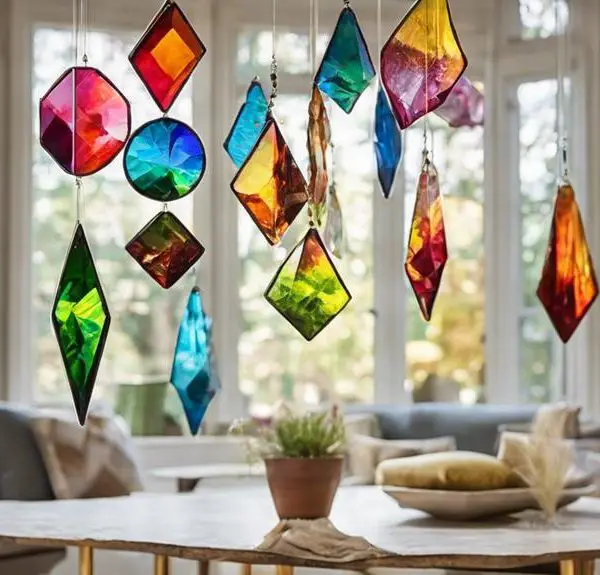Kickstart your journey to harmony with these vital Feng Shui dos and don'ts, and discover how simple changes can transform your space's energy.

Feng Shui Dos and Don'ts
Is it truly possible to influence the energy of your surroundings merely by rearranging furniture and décor, as Feng Shui suggests?
You've probably heard about this ancient Chinese practice, designed to create harmony in our living and working spaces. There are numerous dos and don'ts to consider, each with its potential impact on the flow of positive energy.
So, let's examine these, and see if you can't transform your space into a haven of positivity.
Curious about how to get started? Stick around, there's plenty more to uncover.
Key Takeaways
- Balancing the Five Elements and utilizing the Bagua Map are essential practices for Feng Shui harmony.
- Overuse of Feng Shui cures and neglecting the entryway can block positive energy flow.
- Maximizing positive energy involves energy visualization, chi flow optimization, and the use of mirrors and natural elements.
- Avoiding misconceptions, Feng Shui is about health, relationships, and wellbeing, requiring careful planning and not just for the affluent.
Understanding Feng Shui Basics

Before you can effectively apply Feng Shui principles to your space, it's essential to grasp the fundamental concepts that underpin this intricate and ancient Chinese art. At its core, Feng Shui is a practice that aims to harmonize the flow of energy, or 'chi', within a space. It's predicated on the Harmony Principles, which advocate for balance and order in your environment.
A crucial aspect of these Harmony Principles is the concept of Elemental Balance. Feng Shui recognizes five elements: Wood, Fire, Earth, Metal, and Water. Each carries unique characteristics and energies. Balancing these elements within your space promotes positive energy flow and leads to beneficial outcomes.
For instance, Wood symbolizes growth and creativity, while Fire represents passion and transformation. Earth signifies stability, Metal indicates strength, and Water embodies wisdom and serenity. When you integrate these elements seamlessly into your living or working environment, you're inviting harmony and prosperity.
Essential Feng Shui Dos

Embracing Feng Shui's elemental balance in your personal space involves a few critical 'dos' that can significantly enhance the flow of positive energy. An essential 'do' is balancing the Five Elements—Wood, Fire, Earth, Metal, and Water—in your environment. Each element carries a unique energy, and their harmonious coexistence can foster health, prosperity, and contentment.
Consider incorporating the Bagua Map, a fundamental Feng Shui tool. This octagonal grid contains the symbols of the I Ching, the ancient oracle, and is used to analyze the energy of a given space. You can overlay it on your home's floor plan to identify which areas correspond to different life aspects. Then, you can enhance those areas with the appropriate elements.
For instance, the South sector of your home, linked to Fame and Reputation, resonates with the Fire element. You could boost this area's energy by introducing red décor, candles, or images of sunlight.
Don't forget that Feng Shui isn't a one-off task; it requires regular attention and care. As you live and grow, your space should evolve with you, always promoting positivity and balance.
Common Feng Shui Don'ts

Just as crucial as knowing the 'dos' of Feng Shui, it's equally important to be aware of common mistakes or 'don'ts' to ensure the energy in your space flows unhindered. One myth is the more Feng Shui cures you have, the better. This isn't true. Overdoing it can cause negative energy, clutter, and confusion.
| Common Feng Shui Don'ts | Their Impact |
|---|---|
| Overusing Feng Shui cures | Leads to clutter, confusion |
| Ignoring the entryway | Blocks positive energy, luck |
| Placing the bed in direct line with the door | Disturbs sleep, impacts relationships |
Don'ts impact on relationships is especially critical, such as placing your bed in direct line with the door—a common mistake that disturbs sleep and relationships. Another myth worth busting is ignoring the entryway. In Feng Shui, the entryway is the mouth of Chi (energy), and ignoring it can block positive energy and luck from entering your home.
Maximizing Positive Energy

To maximize the positive energy in your space, understanding and implementing key Feng Shui principles is vital. It's not just about arranging furniture or decorating with specific colors; it's about creating a harmonious flow of energy, or Chi, in your environment.
Employing Energy Visualization Techniques can assist in this process. Visualize your room as a living, breathing entity. Imagine a gentle river flowing through it. Where would it run smoothly? Where might it get stuck? This visualization helps identify areas of potential energy stagnation and guides your rearrangement efforts.
Next, focus on Chi Flow Optimization. It's essential to keep the energy moving smoothly. Avoid blocking entrances and pathways, both physically and visually. Mirrors can be used judiciously to correct energy flow, as they have a powerful ability to redirect Chi.
Don't forget the importance of natural elements. Water, in particular, is a powerful Feng Shui cure with its innate ability to flow and cleanse. A simple water feature can significantly impact the energy of your space.
Maximizing positive energy via Feng Shui involves an intuitive and mindful approach. Remember, it's about balance and harmony – nurturing a space where energy can flow freely and positively.
Avoiding Feng Shui Misconceptions

While nurturing a harmonious environment is crucial, it's equally important to steer clear of common misunderstandings about Feng Shui that could potentially hamper your efforts. Let's delve into some misconception debunking to shed light on the truths behind these Feng Shui myths.
One prevalent misconception is that Feng Shui is about superstitions, rituals, or religion. It's not. It's essentially a Chinese philosophical system of harmonizing everything surrounding us—it's more about spatial arrangement and orientation.
Another myth is that Feng Shui is all about wealth and prosperity. Yes, it can help attract these aspects, but it's not a magic ticket to instant riches. It's about creating a balanced and positive energy flow that supports health, relationships, and overall wellbeing too.
You might hear that Feng Shui is hard and complex. It's true that it requires understanding and careful planning, but don't let this intimidate you. With practice, you can effectively apply its principles in your living space.
Lastly, the myth that Feng Shui is only for the affluent is false. Regardless of your social strata, you can implement Feng Shui principles to improve your life quality. Remember, it's about harmony and balance—not material wealth.
Practical Feng Shui Tips

Dipping your toes into the world of Feng Shui, you'll find a myriad of practical tips that can effortlessly be incorporated into your daily life to foster positivity, balance, and harmony. One of the most influential elements of Feng Shui is color symbolism. Each color carries a certain energy, and implementing it correctly can significantly shift the energy in your space. For example, blue represents tranquility and calmness, while red symbolizes power and passion. Varying your color palette according to your mood and desired effect can be a powerful tool in creating a harmonious environment.
Another crucial aspect to consider is Bagua mapping, an ancient Chinese system used to analyze the energy of a given space. It's like a blueprint for your home or workspace, allowing you to identify areas that are energetically lacking or excessive. By aligning your living or working space with the Bagua map, you're creating an environment that's in tune with the natural world, thus promoting health, prosperity, and overall well-being. As you delve deeper into the practice, these practical Feng Shui tips will serve as a foundation, guiding you towards a balanced, harmonious life.
Frequently Asked Questions
How Does Feng Shui Affect Relationships and Love Life?
Feng Shui can significantly influence your relationships and love life. By focusing on areas like your bedroom, you're able to create a Romantic Energy Boost.
Carefully chosen objects, colors, and their placement can foster Relationship Harmony. For example, soft lighting, paired objects, or pink hues can enhance love and unity.
Can Feng Shui Influence My Financial Success?
Absolutely, feng shui can influence your financial success. By placing wealth symbols, such as coins or money trees, in your prosperity corner, you're attracting positive energy towards your finances.
It's about creating a balance and flow of energy in your space. But remember, it's not a magic trick. You've got to put in the work too.
Keep your area clean, decluttered and let the energy flow freely.
How Can I Implement Feng Shui Principles in My Workplace or Home Office?
You can certainly harness feng shui principles for your workspace or home office. Start by reducing workspace clutter. It's not just about tidiness, but also about creating positive energy flow.
Next, pay attention to your desk orientation. Ideally, you should face the door but avoid being directly in line with it.
Are There Specific Feng Shui Practices for Children's Rooms or Nurseries?
Yes, there are specific Feng Shui practices for children's rooms and nurseries. You should consider the color significance in Feng Shui. Choose soothing colors like pastels, which promote calmness and positivity.
The room layout is equally important. Position the child's bed away from the door but ensure they can still see it. Avoid placing the bed under a window or sloping ceiling.
It's all about creating a safe, balanced and harmonious space for your child.
Can Feng Shui Principles Help Improve My Health and Well-Being?
Absolutely, applying Feng Shui principles can enhance your health and well-being. These practices are known for boosting immunity and enhancing sleep.
For instance, you'll feel revitalized by decluttering your space and positioning your bed for optimal sleep. Using the right colors can stimulate healing energies. It's not just about aesthetics; it's a holistic approach to better living.
Conclusion
In conclusion, balancing your home with Feng Shui isn't as daunting as it seems. Remember, it's about embracing the positive and shunning the negative.
Do keep your space clutter-free and vibrant, don't block your entrances with furniture. Avoid misconceptions and embrace practical tips.
Mastering Feng Shui is an art, a journey of discovery that ultimately leads to a harmonious living space. So, dive in, explore and enjoy the serene ambiance you can create.



Sign up